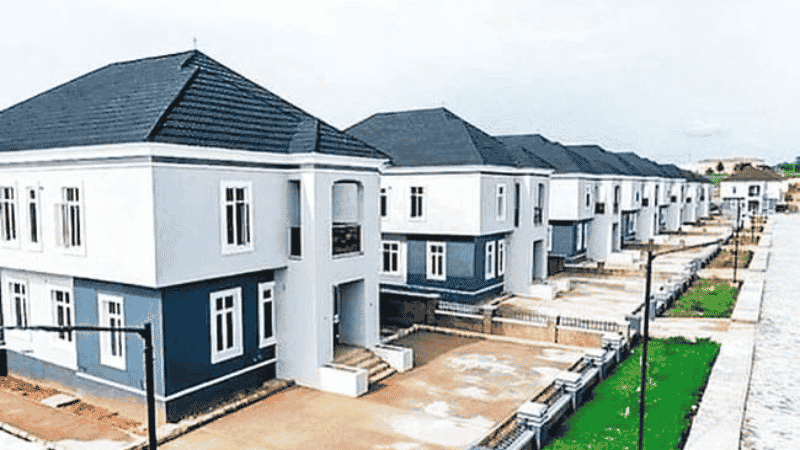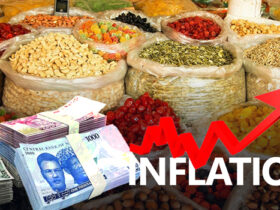Preliminary data from the ongoing rebasing of Nigeria’s Gross Domestic Product (GDP) and Consumer Price Index (CPI) reveal that the real estate sector has surpassed oil and gas to become the country’s third-largest economic sector.
According to BusinessDAY, real estate now trails crop production and trade, which have emerged as Nigeria’s largest and second-largest sectors, respectively.
Previously, agriculture was Nigeria’s dominant sector, contributing over 20 percent to the nation’s GDP.

It encompassed subsectors such as crop production, livestock, forestry, and fishing.
However, with crop production now classified as a standalone sector, it has risen to become the nation’s second-largest industry. In the third quarter (Q3) of 2024, agriculture accounted for 28.65 percent of overall GDP.
Telecommunications, previously grouped under information and communication, has also been redefined as a standalone sector and is now Nigeria’s fourth-largest industry.
In Q3 2024, the information and communication sector contributed 16.35 percent to GDP.
Trade, now the country’s second-largest sector, accounted for 14.78 percent of GDP during the same period.
The rebased GDP structure also places crude petroleum and natural gas, construction, and food, beverages, and tobacco as the fifth, sixth, and seventh largest sectors, respectively.
Public administration, which was previously among the top seven, has been displaced entirely.
In nominal terms, real estate services expanded by 46.52 percent in Q3 2024, a sharp increase of 43.70 percentage points compared to the same period in 2023.
However, this growth rate was slightly lower than that of the preceding quarter.
On a quarter-on-quarter basis, the sector grew by 16.15 percent and contributed 5.43 percent to real GDP in Q3 2024, slightly below the 5.58 percent recorded in Q3 2023.
Despite challenges like declining purchasing power, demand for real estate in Nigeria continues to grow.
While estimates of Nigeria’s housing deficit vary, many experts place the shortfall at 28 million units, emphasizing the need for 700,000 new homes annually.
The sector is projected to reach a market value of $2.61 trillion by 2025, according to Statista, underscoring its significant growth potential.
“Among the various segments within the market, residential real estate holds the largest share, with a projected market volume of $2.25tn by 2025,” Statista says.
READ ALSO: NBS to Include Prostitution, Drugs Peddling, Other Illegal Activities in GDP Calculation
“Over the period of 2025-2029, the market is expected to exhibit a compound annual growth rate (CAGR) of 6.91 percent, resulting in a market volume of $3.41tn by 2029. When compared globally, the United States is projected to generate the highest value in the Real Estate market sector, amounting to $136.6tn in 2025.
“The real estate market in Nigeria is experiencing a surge in demand for luxury apartments in major cities.”
The National Bureau of Statistics (NBS) initiated the rebasing of Nigeria’s Gross Domestic Product (GDP) and Consumer Price Index (CPI) last year.
This effort, recommended by the United Nations Statistical Commission every five years, aims to provide a more accurate reflection of current economic conditions. The previous rebasing, conducted in 2014, resulted in an 89 percent increase in GDP, making Nigeria the largest economy in Africa.
During a sensitization workshop hosted by the Nigerian Economic Summit Group (NESG) in collaboration with the NBS, Moses Waniko, Technical Assistant to the Statistician General, outlined the provisions of the new rebasing exercise.
Waniko explained that the base year has been updated to 2019, replacing the previous base year of 2010.
The exercise incorporates emerging sectors such as the digital economy, modular refineries, pension fund administration, the national health insurance scheme, and mining.
Pointing out its significance, Waniko stated that the rebasing will enhance economic and development planning, foster growth, and expand the economy’s size.
“This current exercise will enhance data accuracy and inform better policy-making in the light of recent economic shifts, particularly in technology and digital sectors.
“It is good to look at the rebasing from different angles, not just the aggregate numbers. It is good to look at what those numbers are supposed to tell us in terms of the distribution, the aggregate numbers, in terms of their weights, contributions and the rest. Beyond that, there are other implications for the national economy. The first is rebasing will provide or allow for an economic and development plan,” he said.
“The second is that the rebasing will really help to provide a good trajectory for the economy. Beyond this, it’s important to also state that after the rebasing, there are certain things that we expect might change such as changes in the size of the structure of the economy. We expect that the size of the economy will be bigger.
“The tax-to-GDP ratio is something that people may want to see. Debt to GDP ratio of 18.5 percent as of September 2019 could also reduce with the bigger size of the GDP, and then per-capita income will increase after the rebasing,” he further said.
In his keynote address, Adeyemi Adeniran, statistician general of the federation, explained that rebasing both the GDP and CPI is a vital exercise that ensures the economic indicators are current and accurate reflections of the economic realities.
He said as economies evolve, new industries emerge, and consumption patterns shift, justifying why the statistical measures must be updated to capture these changes.
“Rebasing our GDP and CPI allows us to align with these transformations, providing a more precise and relevant picture of Nigeria’s economic landscape. This process is foundational to informed policymaking, strategic planning, and effective governance. Hence, it is one exercise that the NBS is conducting with significant importance and professionalism.
“As we proceed with the finalisation of the rebasing of our GDP and CPI, I want to highlight this key point. The rebasing exercise is designed to ensure that our economic indicators accurately reflect the current structure of our economy, incorporating new and emerging sectors, updating our consumption baskets, and refining our data collection methods. This is our responsibility as the official producer of data in Nigeria,” he said.
In his remarks, Tayo Aduloju, CEO of NESG, said, “Economic (GDP) rebasing, in essence, is a recalibration – an exercise with profound significance and akin to cleaning the lenses through which we view our economy – allowing us to see a clearer, more accurate picture of its structure, size, and potential.
“As economies evolve, new industries emerge, technology transforms markets, and the contributions of different sectors shift. Without updated economic measurements, we risk underestimating our true economic capacity.
“When we embarked on a similar rebasing in 2014, our GDP leapt by nearly 90 percent, elevating Nigeria’s economy to $510 billion and positioning it ahead of South Africa as the largest economy in Africa. This was not a fabrication; it was a reflection of reality.”
Commenting on the results of the rebasing exercise, Muda Yusuf, chief executive officer, Centre for the Promotion of Private Enterprise (CPPE), noted that the outcomes of rebasing exercise would serve as a critical planning tool for businesses, especially private sector players.
He stressed the need to review the weighting component in formulation of the GDP growth. According to him, some sectors critical to the overall economic growth are underperforming, while others with less impact are recording growth but not impacting the economy.
This, for him, does not reflect the true status of the economy, and must be addressed.
“We have some sectors that are not really recording growth while other critical sectors are not doing well. This distorts the picture of what the economy truly looks like.”
Analysts at CardinalStone Research said the rebasing is likely to shrink the size of the informal economy.
“The re-weighting of the CPI basket may result in a reduction in the impact of food and non-alcoholic beverage price changes on the overall headline inflation reading.”
(BusinessDAY)
Follow the Parallel Facts channel on WhatsApp: https://whatsapp.com/channel/0029VaCQSAoHgZWiDjR3Kn2E









Leave a Reply